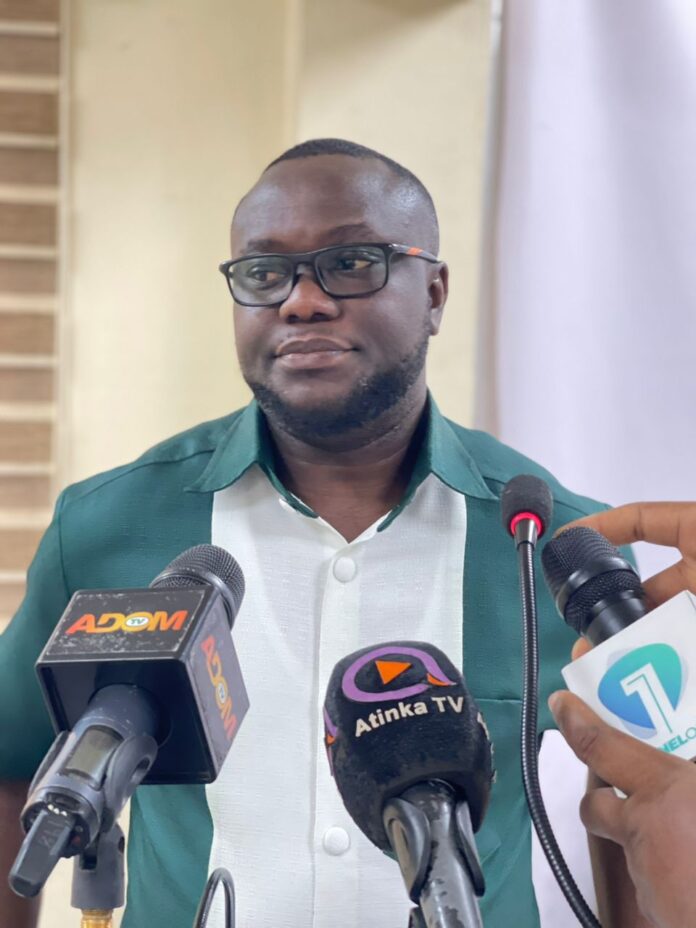The Parties Without Representation in Parliament have accused the Economic and Organised Crime Office (EOCO) of conducting “shoddy and incomplete” investigations in the ongoing prosecution of former National Signals Bureau (NSB) Director-General Kwabena Adu-Boahene.
At a press conference in Accra, the group, led by the General Secretary of the Great Consolidated Popular Party, Citizen Ato Dadzie, said EOCO’s flawed investigative work forms the shaky foundation of a politically charged case that not only lacks credibility but also risks compromising Ghana’s national security.
“Let us be clear — the Adu-Boahene trial should never have reached the courtroom. It is based on claims by EOCO that have now been exposed as inaccurate and unverified,” the group said. “The investigative work was shoddy at best, and pursuing this case any further only serves to embarrass the Attorney-General and waste the court’s time.”
The case concerns the alleged non-delivery of a cyber defence system procured by the NSB in 2020. The Attorney-General’s office, citing EOCO’s report, has argued that no such system was received by the government. However, the Parties Without Representation say new evidence from the supplier contradicts this claim.
International Security Consulting Holding Ltd. (I.S.C Holding Ltd.), the Israeli company contracted to supply the equipment, stated in a formal letter dated May 28, 2025, that “all cyber defence systems… were fully delivered to Ghana’s National Security.”
“So, on what grounds is this prosecution continuing?” the group asked. “When the supplier confirms delivery, and the National Security establishment is reportedly using the system, why is Mr. Adu-Boahene being dragged through a public trial?”
The group also criticized Attorney-General Dr. Dominic Ayine for allegedly ignoring this crucial evidence and conducting what they described as a politically motivated “media trial.”
“Justice is being conducted in front of cameras, not in court. The Attorney-General has chosen spectacle over substance,” they said. “This case is not about fighting corruption. It is about persecuting a former public servant based on incomplete investigations and unverified assumptions.”
They further raised concerns about the national security implications of the ongoing trial, warning that publicly debating the delivery and capabilities of a confidential cyber defence system exposes Ghana’s security infrastructure to unnecessary scrutiny and potential threats from foreign adversaries.
“Cyber defence systems rely on confidentiality. Once you start debating their delivery, capabilities, and cost in open court, you weaken the entire architecture. This prosecution is not only baseless — it is reckless,” they cautioned.
Citing inconsistencies in the government’s anti-corruption agenda, the Parties Without Representation accused the Attorney-General’s office of selective justice, noting that cases involving individuals affiliated with the ruling NDC have been quietly discontinued, while former NPP appointees face trial amid intense media attention.
“Justice has become a political tool. The Adu-Boahene case is just one example where due process has been sacrificed for partisan gain,” they said. “This approach threatens to destroy public confidence in the judiciary.”
The group concluded by demanding that the Attorney-General withdraw the case and focus on restoring integrity to the justice system.
“We are not saying wrongdoing should go unpunished. We are saying that prosecutions must be based on credible evidence, not politics. The Adu-Boahene case fails that test entirely.”
They warned that if such practices continue, the rule of law in Ghana risks being permanently undermined.
ALSO READ:



